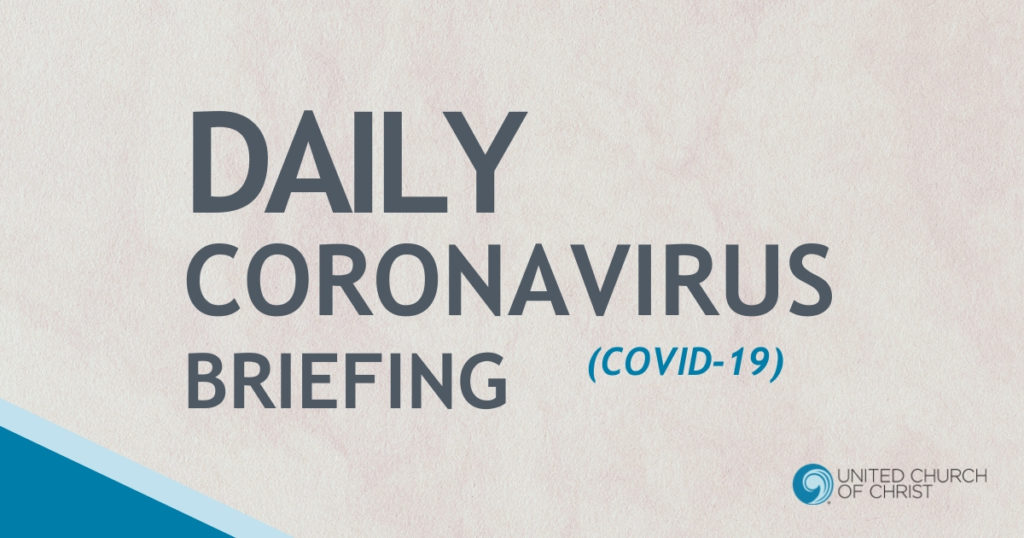DACA students excluded from COVID-19 education aid fund
United Church of Christ – Wider Church Ministries
Humanitarian Development Team
Coronavirus (COVID-19) Daily Briefing
Barbara T. Baylor, MPH – Temporary Health Liaison
What Happens to a Dream Deferred: DACA Students not Eligible for Coronavirus Educational Stabilization Fund
On March 28, 2020, President Donald Trump signed a $2.2 trillion coronavirus (COVID-19) relief bill known as the Coronavirus Aid, Relief, and Economic Security (CARES) Act, an effort to provide some relief from the effects and impacts of the pandemic.
The CARES Act provided $30.75 billion to the U.S. Department of Education (DOE) for an “Education Stabilization Fund,” which sets aside almost $14 billion to go directly to higher education institutions to support the costs of closing campuses and shifting to online classes. About 50 percent (approximately $7 billion) was to be used for direct emergency grant aid to all students affected by campus closures to address living expenses such as housing, food, childcare and health care. (Click here to see a more detailed breakdown of this figure).
The DOE gave institutions discretion to decide how to allocate and disperse the funds. However, last week in a surprise turn of events, U. S. Secretary of Education Betsy DeVos released new guidelines that limit aid only to students who qualify for federal financial aid – meaning U.S. citizens and some non-citizen residents who can apply for the Free Application for Federal Student Aid (FAFSA).
Undocumented immigrants participating in the Deferred Action for Childhood Arrivals (DACA) Program are not eligible for federal financial aid and thus are barred from participation in receiving any aid from the Coronavirus Education Stabilization Fund.
Worth noting here is that the CARES Act does not once mention FAFSA or a student’s documentation status. In fact, the CARES Act did not prohibit DACA students from receiving this emergency aid. Even though DACA students are taxpayers themselves, the DOE insists that the CARES Act makes it clear that this taxpayer-funded relief fund should be targeted to U.S. citizens.
According to an April report by New American Economy, an estimated 454,000 students currently attending U.S. colleges and universities are undocumented.
The DACA program was created in 2012 by the Obama Administration after Congress failed several times to pass the Development, Relief and Education for Alien Minors (DREAM) Act. The young people impacted by DACA and the DREAM Act are often referred to as “Dreamers.” DACA shields from deportation some young undocumented immigrants who often arrived at a very young age in circumstances beyond their control.
DACA recipients now face not only school interruption but also being barred aid from the education stabilization monies to pay for school. Furthermore, they, face job loss and unemployment due to business closures (they are not eligible for unemployment insurance), homelessness, food insecurities and lack of health care.
And they risk being deported.
Due to the spread of the COVID-19, U.S. Citizenship and Immigration Services (USCIS) has temporarily suspended in-person services at many field offices and Application Support Centers, leaving many DACA recipients facing a delay in their renewals. Organizations like United We Dream are calling for automatic renewals for DACA recipients whose permits expire in 2020 to avoid a lapse or deportation.
On top of this, the Supreme Court is considering a case that will decide whether to overturn or let stand the Trump Administration’s orders to end the DACA program. The Court is expected to issue a decision by June. Their decision will affect more than 660,000 DACA recipients currently enrolled in the program.
Unauthorized immigrants are not immune from the effects of the current COVID-19 crisis. Leaving them out of the stimulus bill puts them at greater economic and health risk. Ending the DACA program and barring educational aid through the stimulus bill is a double whammy for these recipients.
The United Church of Christ and other faith-based organizations have challenged the Trump Administration’s efforts to end DACA, believing that the 2017 rescission of DACA, which shields recipients from deportation and allows them to work, is unlawful.
Support United We Dream and other organizations by calling the White House and demanding that President Trump and the Department of Homeland Security automatically extend DACA protections that expire in 2020 and withdraw their DACA case at the Supreme Court during a pandemic crisis that is further endangering all of our communities.
Note: DACA recipients are still excluded in the just-signed CARES Act.
References:
Betsy DeVos callously bars undocumented students from emergency covid-19 relief
Consideration of Deferred Action for Childhood Arrivals (DACA)
Resources on Deferred Action for Childhood Arrivals
DeVos Blocks DACA Students from Coronavirus Emergency Grant Aid
DeVos Excludes ‘Dreamers’ From Coronavirus College Relief
Advising Undocumented Students
Trump administration bars DACA and undocumented students from billions in federal aid
Higher Education Emergency Relief Fund
DeVos bars undocumented college students from emergency aid
‘Cruel and Outrageous’: DeVos Blocks Undocumented Students from Receiving Coronavirus Aid
DACA Recipients, Undocumented Immigrants Ineligible For COVID-19 Assistance For College Students
Related News
Planning for Earth Month: Resources for Congregations
April is Earth Month, and for congregations, it can be a great time to further discern how...
Read MoreBodily Autonomy Means Every-BODY
Advocacy and Action for Women's and Gender Justice Local events stir thoughts and...
Read MoreAn ally experiences PRIDE in the CLE
Advocacy and Action for Women's and Gender Justice Local events stir thoughts and...
Read More


